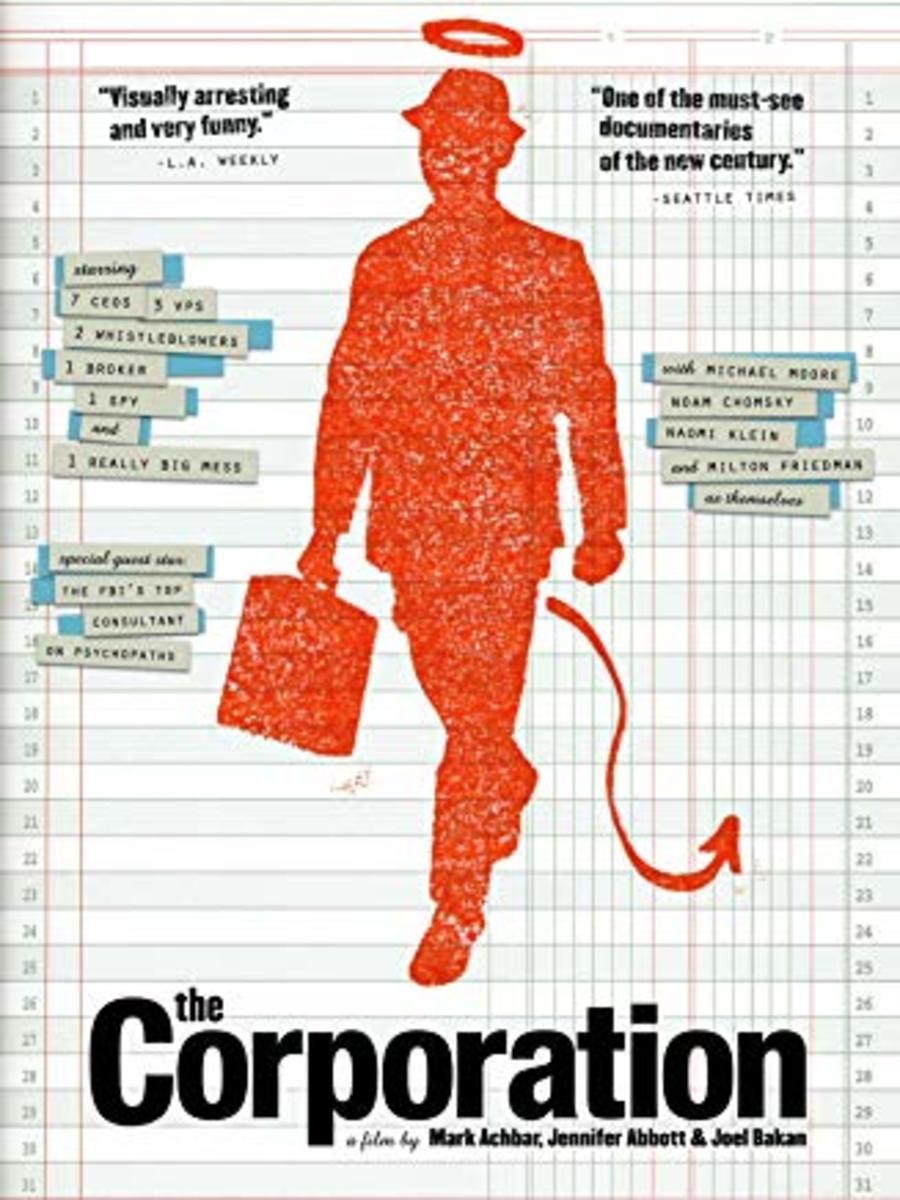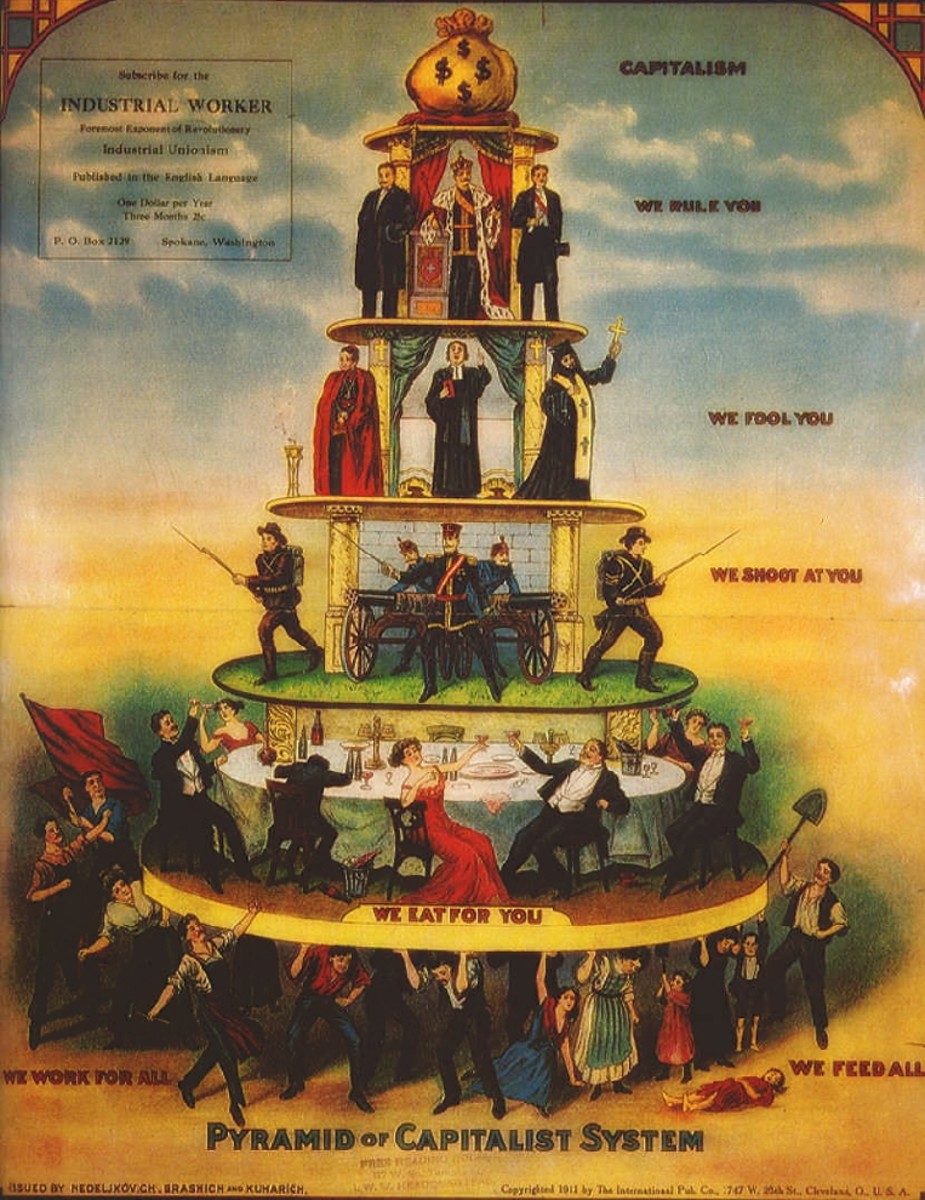The American Dream 2016
Corporations and Individuals
Individuals who work for corporations are among the luckiest in the world. Many are paid good salaries and receive great benefits, like major medical, lunch discounts, educational opportunities, transportation reimbursements, paid vacations, personal days, and pensions for old age. But although it may seem as though the entire American work force is ensconced inside those tall skyscrapers on Manhattan Island, this is far from the case. There are fifty states and not everyone works in a multi-national behemoth raking in billions of dollars in pharmaceutical R&D, marketing, advertising, banking, energy, insurance, and, controversially, genetic modification. Even if they did, they would be well aware of the pay differentials that characterize their companies. Others are turned off by these large dynamos. Why spend one's whole life a cog in machinery owned and operated by complete strangers? It is not so very different now than it was over a hundred years ago when it was all about capital versus labor. By now, so many of the grievances of a bygone era have been addressed that there is just no going back. A good illustration is Upton Sinclair's The Jungle (1905), in which stockyard owners reside in luxuriant mansions by the lake while working stiffs are jammed into rat-infested spaces, subjected to disease and despair. Nevertheless, there is a growing, sizable population of citizens who think that America's economic system has already self-destructed, or that it is only a matter of time. In effect, there is really no inside track to either get ahead, though there are exceptions, or realize a self-made economic dream, though, again, there are exceptions.
The "Floor" of the Chicago Mercantile Exchange

Taxes
Learning about the shenanigans of today's corporations involving billions of dollars to both dodge taxes and, with lay-offs and buy-backs, bulk up their shareholder price, causes one to think. It is not unfair. On the other side of the coin, anyone making less than fifty thousand dollars a year is probably going to need every last cent. Things are that expensive just to live, not merely above subsistence level, but beyond a realistic norm. The latter unhappily involves neighborhoods that are unsafe, rude, noise polluted, in disrepair, and rife with gangs and graft. Thus, it should be the other way around. Instead of multi-billion dollar corporations paying no taxes, citizens should be allowed to hold onto their modest gains. Wealthy corporations with rich coffers can easily make up the difference. Is this do-able? Absolutely not. But let the idea fester in the minds of the impressionable young and the necessary alchemy might just stumble upon a way.
Let's face up to it. If the national debt is over eighteen trillion dollars, then plucking a few hundred or thousands from average workers and their skimpy paychecks is virtually meaningless. What appears to be happening is the gradual production of a population of tax slaves, not free citizens. People do not, should not, work for the government, unless they are government employees -- by no means, one admits, a bad situation either. Nevertheless, taxes should come "off the top", not cut wholesale from the very guts of employees and employers. How will the Treasury eventually settle so high a debt? By now the next step is being spoken of in conferences and watering holes: confiscation. The government, if necessary, will simply help itself, as though it were the guest of honor at a sumptuous banquet. Hopefully this will never happen is a sentiment one can take to the bank but not deposit.
Capital as Mystery
The invisible hand of Adam Smith was one thing. Complete invisibility is another. Yet that is exactly what obtains. For instance, almost thinking investor feels in his or her bones that the stock market is rigged. However, only those in on the fix would be able to offer proof. It is not much different with auxiliary markets -- commodities, warrants, options, currencies, bonds, indexes, credit debt, derivatives, and arbitrage -- none of the above are qualitatively much different than professional wrestling. A recent Sundance documentary (We're Not Broke) tells of instances in which corporate revenues in the billions required no payment whatsoever of federal income tax. To achieve these miracles, big companies made circuitous use of foreign banks, or, in some cases, law offices -- strategically located in places like the Cayman Islands. Several companies, such as major banks, were bailed out, gratis, for as much as a trillion dollars. What does this mean for individuals? Some have already decided. They moved to Latin and South America. But most of us clearly intend to see the awful thing through here at home, whatever it may be.
We are acquainted with the big name corporations that make enormous amounts of money. But most companies are not big and realize only a fraction in comparison. Lately, a lot of talk has gone on about raising the minimum wage. It is already past due. Of course wages should rise. Everything else has. But again, taxes for small businesses have to be adjusted accordingly. It would be better for minimum wage earners to have some skin in the game as well as defuse whatever it is that the current administration repeatedly refers to as trouble in the workplace. This amounts to regulation, often regarded as countrary to Capitalist principles. Deregulation, however, is more to blame than praise for the unprecedented creation of a debt-laden nation.
Is it Fixable?
In Saving Capitalism, For the Many, Not the Few, Robert B. Reich, former Secretary of Labor (1993-97), makes the following point, only one among a very valuable compilation: a Supreme Court decision in 2010 "declared that corporations are people under the First Amendment, entitled to participate fully in elections through financial contributions" -- p. 179. Jules Verne was never this imaginative. In other words, money as much as merit influences elections. Up until now, a series of like-minded decisions involving multiple administrations have enabled Wall Street, as well as D.C. insiders, such as lobbyists, to capture more and more of the economic pie. In fact, the floodgates have long since been opened. Extensions on patents and copyrights ensure that corporations will enjoy windfall profits for years to come. Reich also mentions how local businesses not only suffer but have been pushed to the brink of extinction. One can seriously question if indeed the sum total of these types of decisions are truly consistent with Capitalism or, further, whether or not they are even American.
Once before, in the 1970s, the economy was very grim with no solution in sight save a vicious cycle of hard work, low pay, and infinite, stoical patience, in addition to downward mobility. The bull markets of the next decade did a great deal to erase that recessionary era from memory. But since then, greater and greater permissiveness in what markets and market players can and cannot do has led to excesses than have never been known, almost, since the Roman Empire. How nice it would be for our 1% to spend the greater bulk of their time taking long baths, but instead they are actively engaged without having ever been elected to office in the day-to-day functions of national and regional government. It is just something that they do when they should be doing something else altogether. Well-meaning groups and charities organize, hold meetings, collect donations, raise funds, stage protests, email representatives, and garner sympathy for early deaths owing to paper mills, pipelines, chemical dumps, and carcinogenic toxicity in every shape and form. But they cannot fight evils that are so damn lucrative.
The Limits of Both Liberalism and Conservatism
Reich speaks of countervailing forces, all of which would probably, if adopted, remove a great many obstacles preventing people from earning decent livings. Still, one can see with the naked eye and hear with one's own ears just what much of America has become. Incredible debt, taxes so high, no protracted foreign wars, and yet the infrastructure of this great country is falling into ruin. Right up the road from where I live is a great American city of 100,000, some of which has great appeal. But the older sections are empty, hollow, transitioning into decay, and, though alive with human beings and commercial activity, cause most residents to carefully avoid them. Part of this undesirable area is gorgeous waterfront community. But the big bucks prefer the interstate, miles away. This is far from the exception. Without the means to escape, inhabitants languish. Help is not on the way. The tentacles of cartels, one senses, are also present, so as to assuage the pain. Is this the craftwork of a Nanny State, as the Conservatives aver? Or the inevitable result of the vast indifference of Conservatism, as Liberals maintain?
Earlier, the economy road ever higher on the rails of reform. Child labor laws and shorter hour work weeks might seem the output of the Liberal Mind, but they made practical, good sense. Reich's proposals start with the corporation as the "central organization of modern capitalism". They are thoroughly up to date, dealing as they do with stakeholder versus shareholder capitalism, as well as high frequency trading, which has virtually nothing to do with either. However one feels about tampering with things as they are, the idea of a more balanced, wider based economy, one that benefits more rather than less, is worth attending to. Anyone tired of the same old same old, such as the regularity of the market's knee-jerk reaction to the unemployment figure, job creation, other various economic indicators, consumer confidence, news stories, or how an auction of treasury notes went, is understandably fatigued. Business as usual means an endless series of murky tomorrows up ahead.
Fast Food Joints

The American Dream 1948
In 1948, Superdawg was created in Chicago. It is still around. Hot dogs are not just hot dogs in Chicago, once home to the Union Stockyards. True enough, the latter was far from heavenly. But its whitewashed, selective memory makes for good lyrics in a Sinatra song as well as something to feel proud of after how many hogs were slaughtered? Whatever the astronomical number, the small purpose of this section is only to call to mind that this story and probably at least a million more stories are well-remembered by second, third, fourth, and fifth generational offspring. Reich includes his own about his father's dress shop. Taken together, they form a point of reference to an ideal. The ideal need not be abandoned just because certain achievements are no longer feasible, given the drastic changes that have taken place in finance, culture, and society at large over a substantial period of time. The American Dream of 2016, when it unravels, will provide its own specifications. It is an election year and the incumbents are bent on propping up the economy as best they can. The Republicans have a costlier agenda, since they are more set on confronting foreign threats. But the future is hard to predict. We shall see.








